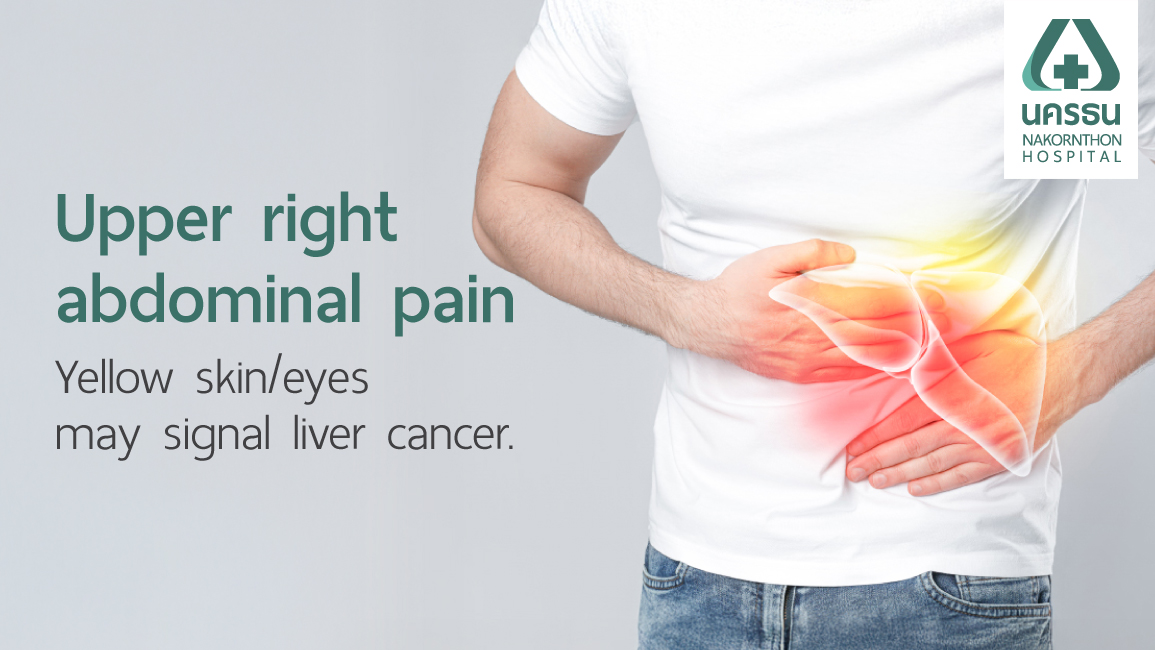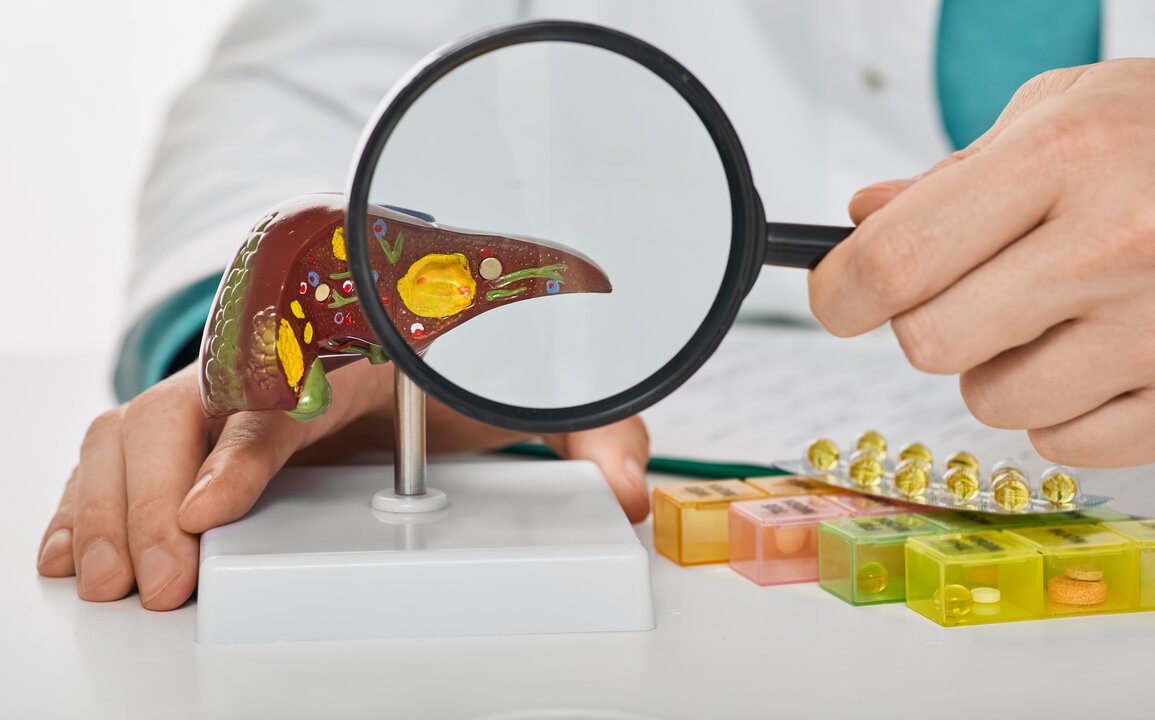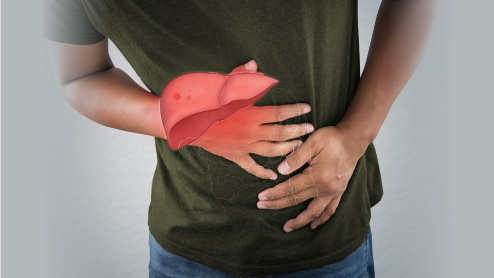Prevent Liver Cancer with the Right Self-Care Habits
Center : Gastrointestinal and Liver Center
Article by : Dr. Sombun Rungjiratananon

Liver cancer symptoms—such as abdominal pain, bloating, or loss of appetite—are often mistaken for common conditions like gastritis, indigestion, or gallbladder disease. This misunderstanding can delay proper diagnosis, allowing the disease to progress to a more advanced stage when symptoms become more apparent. At that point, treatment options may be limited and the condition could be life-threatening.
That’s why recognizing liver cancer symptoms early and consulting a specialist promptly is essential. Early detection and effective treatment can help prolong survival and enhance quality of life.
Table of Contents
- What is Liver Cancer?
- Types of Liver Cancer
- Causes of Liver Cancer
- Risk factors of Liver Cancer
- Symptoms of Liver Cancer
- Liver Cancer Stages
- Diagnosis and detection of Liver Cancer
- Treatment for Liver Cancer
- Prevention of Liver Cancer
- Advanced Liver Cancer Treatment at Nakornthon Hospital
- Free Online Consultation with a Specialist
What is Liver Cancer?


Liver cancer begins when normal liver cells turn into cancerous ones, growing uncontrollably and forming a tumor in the liver. In some cases, the disease can spread to other organs such as the lungs or bones. It often develops in people with chronic liver conditions like fatty liver, cirrhosis, or hepatitis B or C.
Because early liver cancer stages usually show no noticeable symptoms, many patients are diagnosed only after the cancer has advanced. However, liver cancer is a preventable disease with proper health care. Don’t wait for symptoms to appear—those at high risk should get regular checkups to detect liver cancer at an early stage, when treatment is more effective.
Types of Liver Cancer
Liver cancer ranks among the top cancers found in Thai men, especially those between the ages of 30 and 70. Men are 2–3 times more likely to develop liver cancer than women, mainly due to higher exposure to certain risk factors. In most cases, early-stage liver cancer shows no obvious symptoms, making early detection difficult. Liver cancer can be classified into two main types:
- Hepatocellular carcinoma (HCC)—This is the most common type of liver cancer. It develops directly in liver tissue due to abnormal cell growth that turns into a malignant tumor.
- Cholangiocarcinoma (Bile duct cancer)—This form arises from abnormal growth in the bile duct lining cells. One of the primary causes is liver fluke infection, which is commonly found in northeastern Thailand. Other risk factors include frequent consumption of certain carcinogenic foods, such as fermented foods containing nitrites and smoked or preserved meats.
Causes of Liver Cancer
Understanding the causes of liver cancer is essential for prevention and early detection. In Thailand, the leading cause of liver cancer is chronic infection with hepatitis B or hepatitis C viruses. These viruses can be transmitted through blood, from mother to child during pregnancy, or through unprotected sexual contact. Once the virus enters the liver cells, it may cause chronic hepatitis or result in a carrier state, where the individual has no symptoms but can still spread the virus to others.

Risk factors of Liver Cancer
Additional risk factors for liver cancer include:
- Long-term alcohol consumption—Chronic alcohol use increases the risk of liver inflammation and damage, which can lead to cancer.
- Liver cirrhosis—Scarring of the liver from any cause, including hepatitis or alcohol abuse, significantly raises the risk of developing liver cancer.
- Aflatoxin exposure—Toxins produced by certain molds (fungi) that contaminate peanuts, dried chilies, garlic, and grains. These molds generate aflatoxins, which are known carcinogens and a major concern in hot, humid climates.
- For patients with type 2 diabetes, the body cannot effectively regulate blood sugar levels. As a result, the liver converts excess sugar into fat, leading to fat accumulation in the liver. Over time, this may progress to liver cirrhosis or even develop into liver cancer.

Symptoms of Liver Cancer


Liver cancer symptoms vary from person to person. In many cases, there are no noticeable signs in the early stages. Symptoms typically appear when the tumor grows larger. Patients may initially feel abdominal discomfort or indigestion. Some may experience symptoms similar to peptic ulcer disease or have pain in the right upper abdomen, where the liver is located.
As the tumor continues to grow, liver cancer symptoms become more apparent and may include:
- Loss of appetite
- Unexplained weight loss
- Abdominal bloating or swelling (ascites)
- Feeling full easily or persistent bloating
Other advanced signs of liver cancer may include:
- Jaundice—yellowing of the skin and eyes
- Frequent indigestion or bloating
- Fatigue or overall weakness
- Dull or sharp pain under the right rib cage, sometimes radiating to the right shoulder or scapula
- Dark yellow urine and leg swelling
- Unexplained fever
- Palpable mass in the liver area
Liver Cancer Stages
Liver cancer is classified into four main stages, based on the size of the tumor, the number of tumors in the liver, vascular invasion, and whether the cancer has spread (metastasized) to other organs. Here's an overview of the liver cancer stages:
- Stage 1: The tumor is small and confined to the liver. It has not yet spread to blood vessels, lymph nodes, or other organs.
- Stage 2: The tumor is larger, or there may be multiple tumors present in the liver. In some cases, the cancer may have begun to invade nearby blood vessels, but it has not yet spread to the lymph nodes or distant organs.
- Stage 3: The tumor has invaded one of the liver's major blood vessels, or it has spread to nearby lymph nodes, but it still has not reached distant organs.
- Stage 4: The cancer has metastasized to distant organs such as the lungs, bones, or distant lymph nodes.
Diagnosis and detection of Liver Cancer
Initial liver cancer screening includes a medical history and physical examination, along with other tests:
- Laboratory blood tests, including:
- Liver function tests (SGPT/ALT, SGOT/AST, ALP) to detect abnormalities
- Screening for hepatitis B and C antigens and antibodies
- Blood test for AFP (alpha-fetoprotein), a liver cancer tumor marker
- Ultrasound of the upper abdomen (ultrasound upper abdomen): To assess the liver and pancreas for any abnormalities or tumor masses.
- FibroScan: A modern, non-invasive medical technology that evaluates liver fat and the degree of fibrosis or cirrhosis with no pain and quick results.
- CT scan or MRI: Advanced imaging to aid in diagnosis.
- Liver biopsy: A tissue sample taken from the tumor area for definitive diagnosis.
Treatment for Liver Cancer
Liver cancer treatment depends on the disease's severity, tumor size and type, cancer stage, spread, and the patient’s overall health. Treatment methods include:
- Surgical tumor removal: If the cancer is operable, surgery or liver transplantation may be performed.
- Radiofrequency ablation (RFA): High-frequency radio waves are transmitted through a fine needle into the liver tumor. This method is effective for tumors smaller than 3 centimeters.
- Chemotherapy injection (TACE or TOCE): It involves injecting chemotherapy drugs into the hepatic artery. This is used when the tumor is large or there are multiple tumors (typically 3–5 or more).
Prevention of Liver Cancer
Liver cancer can be prevented by:
- Vaccinating all newborns against hepatitis B, as well as unvaccinated adults
- Avoiding raw freshwater fish
- Adopting healthy lifestyle habits including proper nutrition
- Avoiding carcinogenic foods, especially those possibly contaminated with aflatoxins (e.g., improperly stored peanuts, dried spices, grains)
Advanced Liver Cancer Treatment at Nakornthon Hospital
If you suspect you are at risk of liver cancer, you should promptly consult a gastroenterology and liver specialist for diagnostic evaluations. These may include blood tests, hepatitis B and C screening, or assessments for fatty liver and liver cirrhosis—conditions that can lead to liver cancer. These can be examined using FibroScan, a non-invasive diagnostic technology available at the Gastrointestinal and Liver Center.
Nakornthon Hospital offers consultation, diagnosis, and treatment covering all digestive and liver-related conditions through a comprehensive One Stop Service. The center is fully equipped with a gastrointestinal endoscopy suite, colon preparation room, recovery room, and advanced medical equipment—all in one place. Early detection leads to more effective treatment, improves patient quality of life, and helps reduce liver cancer mortality rates.
For more information, please contact:
- - Website : https://en.nakornthon.com
- - Facebook : Nakornthon Hospital - International Patient
- - Line : @nakornthoninter
- - Tel: 02-450-9999 (Available 24 hours)
Free Online Consultation
Article of Gastrointestinal and Liver Center






